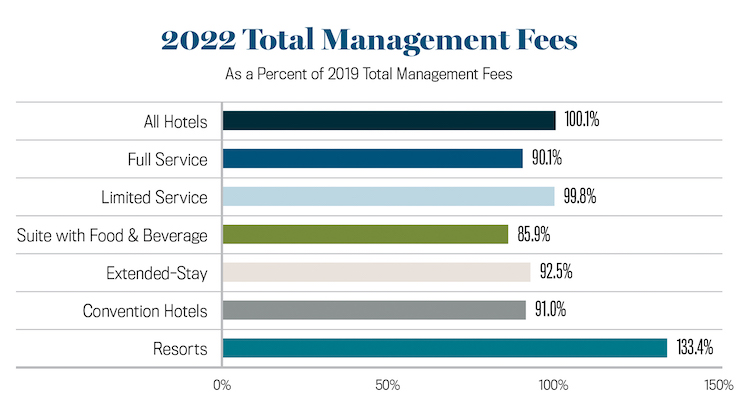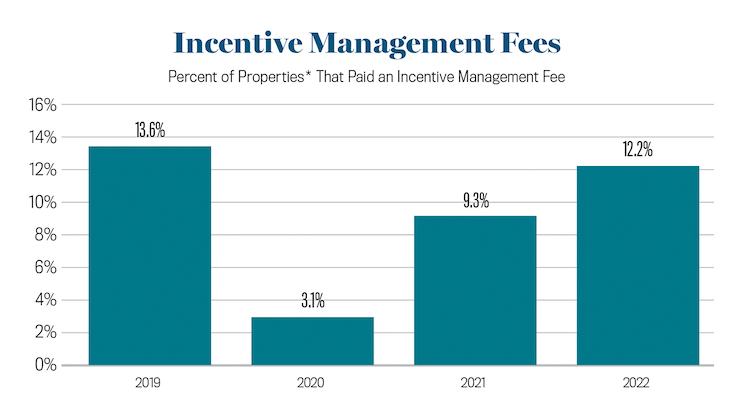Most management contracts include an incentive management fee in addition to the base management fee. The incentive fees are designed to make management more conscious of the bottom line since owners achieve their returns and pay their debts from profits, not revenue. Incentive management fees are earned by the operator once a designated profit threshold is achieved. Given the depressed performance of hotels during the 2020 industry downturn, unsurprisingly almost no hotel owners paid an incentive fee to their managers that year. Fortunately for U.S. hotel operators, incentive fees have risen concurrent with the recovery of hotel profits. In 2022, incentive payment levels began to return to pre-COVID-19 levels.
To gain a better understanding of recent incentive management fee trends, we analyzed the performance of 1,203 hotels that reported paying an annual management fee (base and/or incentive) from 2019 through 2022 for CBRE’s annual Trends in the Hotel Industry survey. In 2022, the research sample averaged 170 rooms in size, and achieved an average occupancy level of 65.9 percent along with an average daily rate (ADR) of $198.68.
Decline from 2019 to 2020
Before the industry recession in 2020, 13.6 percent of the properties in our research sample reported an incentive fee payment. During 2019, total management fees averaged $2,153 per available room (PAR), or 3.2 percent of total operating revenue. Of the $2,153 PAR, $240 PAR was paid as an incentive fee.
In 2019, earnings before interest, taxes, depreciation, and amortization (EBITDA) were 24.5 percent of total operating revenue. The $240 PAR in incentive fee payments averaged 1.4 percent of the $16,596 PAR EBITDA level. Because of the COVID-induced decline in travel, hotel EBITDA declined by 111.2 percent from 2019 to 2020. Accordingly, the percent of properties in the research sample paying an incentive fee dropped to 3.1 percent. Consistent with the relative strength of leisure demand, most of the few properties that paid an incentive fee in 2020 were located in remote leisure destinations. In 2020, the average EBITDA margin for the hotels that paid an incentive fee was 16.5 percent of total operating revenue. This compares with -7.2 percent for the total sample.
Comeback in 2021 and 2022
In 2021, 9.3 percent of the research sample reported an incentive fee payment. This rose to 12.2 percent in 2022.
Among the six property types tracked by CBRE, resort operators have been the most frequent recipients of incentive fee payments. In 2022, 52.9 percent of resort hotels reported the payment of an incentive management fee. This is greater than the 34.4 percent observed in 2019. Unsurprisingly, none of the convention hotel operators in our sample earned an incentive management fee in 2020, 2021, or 2022. This is consistent with the lag in recovery of group demand compared to leisure travel.
In 2022, EBITDA for the research sample averaged $16,442 PAR. This is 99.1 percent of 2019 levels. For comparison, incentive management fee payments exceeded their 2019 levels by 23.9 percent in 2022. During 2022, incentive fee payments averaged 13.8 percent of total management fee payments, and 1.8 percent of EBITDA. It appears that ownership generously rewarded those managers who were able to achieve profit growth within an extremely difficult operating environment.
Management Contract Trends
Changes in the economy continue to play a part in the relationship between owner and operator. This will likely not change going forward because the economy has an impact on hotel demand, operations, and profitability. As a result of the pandemic, many brands granted forbearance (essentially delays) on property improvement plans (PIPs) and any required capital expenditures on franchisees. However, operators and owners are sharing with us that brands are now requiring outstanding PIPs and capital be rectified and completed within the next 18 months. Due to these capital expenditure programs being executed during 2023, the financial performance of the hotel is being negatively impacted as some property components may be “out of order” (rooms, amenities, etc.).
In addition, termination provisions are becoming more favorable for owners and are, in some cases, tied to financial performance. Financial performance is generally tied to the incentive management fees. Therefore, if performance thresholds (i.e., the budget) are not met, then incentive management fees will not be paid.
Negotiating Management Contracts
Negotiating a management agreement in the current environment requires owners and investors to carefully review how the management fees are paid and the thresholds on which the incentive management fees are based. Owners are considering the following criteria when negotiating incentive management fees:
The near- and longer-term economic outlook for the market and for the subject property.
The stage at which the subject property is in its “lifecycle.” For example, older hotels that are architecturally fatigued may be largely impacted by newer hotels entering the market. Thus, upward financial improvement may be limited. A more aggressive incentive management fee might be required for the operator.
The personality of management company leadership needs to match the owner to ensure alignment. Financial objectives and values need to be aligned. Experience with the subject property type and chain scale are very important.














